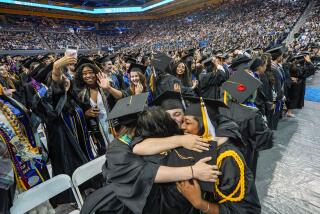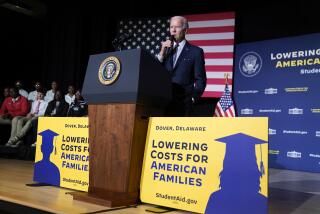Public service can pay off
If you’re facing years of student loan payments but aren’t making much money because you’re working in public service, the federal government has some good news for you. A law that takes effect Tuesday could allow you to have some of your college debt forgiven.
The debt-forgiveness provision of the College Cost Reduction and Access Act, enacted last fall, is designed to encourage college graduates to enter -- and stay in -- public service careers that many people might spurn in favor of better-paying jobs.
Here’s how it works:
What will the provision do?
The program will erase any student loan debt -- including principal and interest -- that a public service worker has after making monthly payments for 10 years.
What’s the catch?
You must remain in a qualifying public service profession for the full 10 years that you’re repaying the loans to be forgiven. If you work as, say, a legal aid lawyer for nine years and then quit to take a job with a private law firm, you’re disqualified.
What qualifies as public service?
Generally, the program applies to anyone who works full-time for a state, federal or local government -- including police officers, firefighters, the military and public school teachers. It also applies to some people outside of government, including employees of tax-exempt, nonprofit organizations and those working in emergency services, public interest law or public child care, healthcare or social work.
Does this apply to all student loans?
No. Only Stafford, PLUS and federal consolidation loans are eligible -- and only if they are made through the U.S. Education Department’s Direct Loan program.
What if I have Stafford or PLUS student loans that aren’t part of the Direct Loan program?
As of Tuesday, anyone with a federally guaranteed student loan can convert it into a Direct Loan consolidation loan and thus qualify for the debt forgiveness option. For information on how to do that, go to loanconsolidation.ed.gov.
Should I consolidate all of my loans into the Direct Loan program?
If you think you’ll be eligible for the debt forgiveness option, you might want to consolidate Stafford and PLUS loans through the Direct Loan program, but probably not Perkins loans, said Mark Kantrowitz, publisher of FinAid.org, a financial aid information website. That’s because Perkins loans already have special features that can make them more attractive than consolidation loans, including heavily subsidized interest.
In addition, if you work as a math or science teacher in a low-income area, you can qualify for a far more generous loan-forgiveness program available only to Perkins borrowers. (The Perkins forgiveness plan erases 30% of the teacher’s debt in the first two years and all of it within five years.)
Some loans, such as private student loans, can’t be refinanced under the Direct Loan program, so they can’t be made eligible for debt forgiveness.
Won’t my loans be paid off in 10 years anyway?
If you choose standard repayment, you’ll pay off your loan in 10 years. But if you have significant student loan debt and aren’t earning a lot of money, a better option may be “income contingent” repayment. Under it, you pay significantly less each month -- and sometimes pay nothing -- depending on your income and how much you owe. That has the effect of stretching out your payments well beyond 10 years.
Every month you’re in the income-contingent repayment plan, even when it requires no monthly payments, counts toward the 120 months required to qualify for debt forgiveness, according to the Education Department.
The less you pay each month under this repayment option, the more debt you’ll have eligible for forgiveness after 10 years.
Do the payments that I’ve already made count?
If you already have a federal Direct Loan, any payments you made after Oct. 1, 2007, will count toward the 120-month requirement. Payments made before that date -- or made to any lender other than the federal government -- won’t count.
What if I don’t know how long I’ll stay in public service?
You should make sure your monthly payments aren’t too low, Kantrowitz said. Under the income-contingent repayment option, it can be possible to make such low payments that they don’t even cover the interest that’s accruing. In such a case, you could leave public service with more debt than when you started.
“If you are not absolutely certain that you are going to stay in public service for the whole 120 months, you should make sure that your payments are at least covering the interest on your debt,” Kantrowitz said.
What else does the new law do?
The College Cost Reduction and Access Act provides a number of breaks for current students, boosting some grants and increasing borrowing limits. I’ll deal with those provisions next week.
--
Kathy M. Kristof welcomes your comments but regrets that she cannot respond to every question. Write to Personal Finance, Business Section, Los Angeles Times, 202 W. 1st St., Los Angeles, CA 90012, or e-mail [email protected]. For past Personal Finance columns, visit latimes.com/kristof.
--
Begin text of infobox
Serving the public
Here are some of the jobs that make people eligible for a student-loan forgiveness program for public service workers:
* Government employees (federal, state or local)
* Police officers
* Firefighters
* Military personnel
* Public school teachers
* Employees of tax-exempt nonprofit organizations
* Emergency management service workers
* Public-interest lawyers (prosecutors, public defenders and legal advocates in low-income areas)
* Public child-care workers
* Public healthcare workers
* Public social workers
* School and public librarians
* AmeriCorps members
Source: Times research
More to Read
Inside the business of entertainment
The Wide Shot brings you news, analysis and insights on everything from streaming wars to production — and what it all means for the future.
You may occasionally receive promotional content from the Los Angeles Times.










